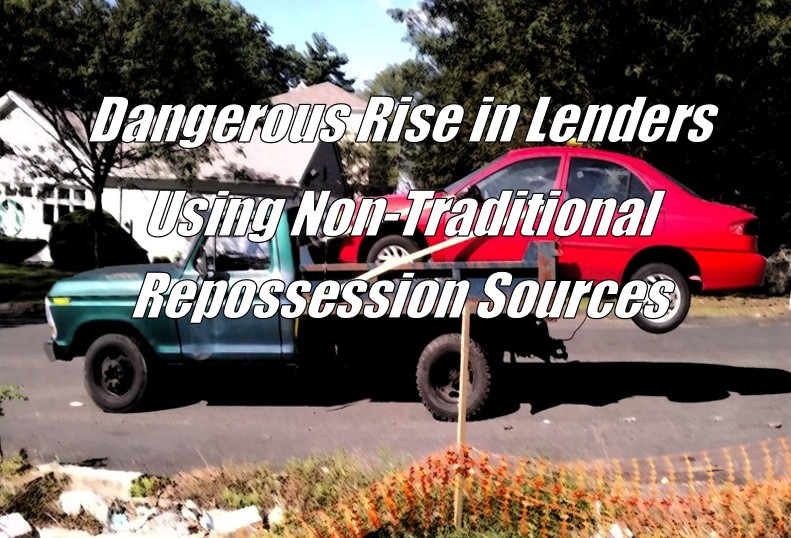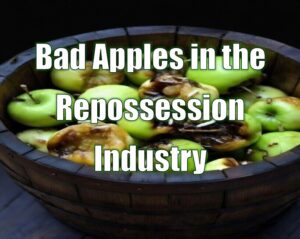The Compelling Case for Hiring Only Professional Repossession Companies: Safeguarding Lenders and the Public
With repossession volume at levels not seen in many years, lenders are seeing recovery expenses soar. Unfortunately, in the face of this unrelenting budgetary pressure, some lenders are stepping outside of the practice of hiring professional Repossessors and assigning work to tow companies, auction houses and worse, often with disastrous results. It’s sad that we should feel compelled to do so, but it seems necessary to remind lenders why professionals should only hire professionals.
In managing auto loan defaults, lenders battle through a labyrinth of legal, ethical, and operational perils every step of the way. Making the wrong step or decision could spell the difference between financial ruin or recovery, between upholding the law or facing its wrath and destroying careers along with a lender’s public image. So, why would any lender in their right mind take such risks? It’s always about the money.
Here, we plunge into the vast differences between professional repossession companies and non-traditional sources for assignments and how these decisions should not be merely a financial decision but a strategic imperative.
Licensing and Compliance:
Professional Repossession Company:
-
- Licensure: Professional repossession companies typically have the necessary licenses to operate legally in their jurisdiction. This includes adherence to state and sometimes federal regulations regarding repossession activities.
- Compliance: They follow industry standards, regulations, and both federal and state laws ensuring that repossessions are conducted legally and ethically.
Non-Traditional Repossession Source:
-
- Licensing: They might not possess the required licenses or operate in areas where they are not legally allowed to perform repossessions.
- Compliance Issues: With many of these types of service providers, repossession specific safety and compliance training is viewed as a minimal requirement. This can lead to dismissive attitudes and practices that pose a higher risk of violating laws, leading to legal repercussions for both the company and the creditor.
Training and Expertise
Professional Repossession Company:
-
- Training: Employees or agents are often trained in the legal aspects of repossession, vehicle handling, and conflict resolution. They hold certifications from recognized compliance bodies in the repossession industry. Foe them training and compliance are ongoing processes that they incorporate into all facets of their operations.
- Specialization: Some staff might specialize in certain types of repossession, like heavy machinery or high-value assets, requiring additional skills and knowledge. They use the right equipment for the job, ensuring safe and damage-free recovery. Staff engaged in lot management utilize best practices in property removal and collateral storage.
Non-Traditional Repossession Source:
-
- Limited Training: Agents are not likely to be trained adequately. At best, they view training as a “one and done” requirement. This often leads to mishandling of collateral, personal property or confrontational interactions with borrowers that shine a poor light on the lenders.
- Amateur Operations: Repossessions could be done by individuals with little to no specialized knowledge or experience. This inexperience can lead to the use of improper equipment and practices that cause unnecessary damage to collateral. Their limited knowledge and or experience can lead to issues of non-compliance, litigation or injury to both employee and borrowers.
Insurance and Liability:
Professional Repossession Company:
-
- Insurance: These companies carry significant and specific repossession insurance to cover damages, injuries, or legal issues that might arise during and after a repossession. This includes liability insurance, property damage insurance, and workers’ compensation.
- Risk Management: They have policies and procedures in place to minimize risks, both to themselves and to the debtor.
Non-Traditional Repossession Source:
-
- Insurance: They might not have adequate or any insurance, increasing liability risks for everyone involved. Remember, the insurance maintained for a tow company or auction house is NOT the same as for a professional repossession agency.
- Legal Issues: Without proper procedures, there’s a higher chance of legal actions against them for improper repossession practices. Anytime a lender is called to court on a legal issue regarding a repossession, as a matter of discovery and under deposition, a standard request from consumer attorneys is the production of company policies and procedures. Absent these, both lender and the repossessing party are defenseless.
Technology and Resources:
Professional Repossession Company:
-
- Use of Technology: Professionals use advanced repossession management tools and process tracking software to manage their assignments, secured collateral and personal property on their storage facilities.
- Infrastructure: They typically have a dedicated group of trained and experienced agents, lot and office staff with specialized recovery training to manage their storage facilities, ensuring a smooth operational flow from repossession to redemption of transport.
Non-Traditional Repossession Source:
-
- Technology: Non-professionals often rely on unsophisticated technologies not specifically used or created for repossession. Lacking the benefit of modern repossession management software, their capacity for tracking assignments and stored collateral is primitive at best and can result in wrongful repossessions, lost collateral or ineffective communication.
- Lack of Infrastructure: They might not have the necessary equipment or facilities to handle repossessions efficiently or securely. There never has been a shortage of unqualified companies operating out of the owner’s house, backyard or on minimally secured lots. Couple this with a lack of professional experience and the impact to the speedy and compliant operational functionality and the probability of service failures is highly probable.
Reputation and Relationships:
Professional Repossession Company:
-
- Client Relationships: They often work with banks, credit unions, and other financial institutions on a contractual basis, maintaining long-term relationships due to reliability and professionalism. They tend to know many of their larger clients intimately and for years.
- Reputation: Their reputation is a key asset, which they protect by ensuring all actions are safe, compliant and above board. While consumers are unlikely to say nice things about them, they are also unlikely to find cause to initiate litigation on them with any level of frequency.
Non-Traditional Repossession Source:
-
- Poor Reputation: Due to the potential for unethical or illegal practices, they might not be trusted by other financial institutions or consumers and often for good reason. Just peek at their Yelp reviews. If they are getting negative reviews for their core competency, how likely is it they will be competent in a duty they only do part time.
Customer Interaction:
Professional Repossession Company:
-
- Client Relationships: They often work with banks, credit unions, repossession forwarding companies and other financial institutions on a contractual basis, maintaining long-term relationships due to reliability and professionalism.
- Reputation: Reputation is a key asset. It is everything. These companies safeguard it through reputable service and strict compliance ensuring all actions are above board.
Non-Traditional Repossession Source:
-
- Client Relationships: They may work private party tows part-time or even be on accident response rotation for law enforcement. Their relationships with lenders are not their core function and as such, not treated with the same regard as a professional.
- Poor Reputation: Due to the potential for unethical or illegal practices, past or present, they might not be trusted by financial institutions or consumers.
Customer Service:
Professional Repossession Company:
-
- Communication: They have established procedures for communicating with both creditors and debtors, often offering professionally managed personal property and redemption procedures.
Non-Traditional Repossession Source:
-
- Poor Communication: Having little or no experience in managing borrowers’ issues, they are prone to unprofessional behavior and interactions with borrowers potentially leading to hostile interactions or misunderstandings.
Professionalism:
Professional Repossession Company:
-
- Engagement: Even amongst professional repossession agencies, there is a level of engagement that separates the best from the rest and that is association membership. Through their membership and participation in their national and or state association memberships they are continuously engaged in best practices and compliance assuring best in industry practices.
Non-Traditional Repossession Source:
-
- Unengaged: Part time engagement leads to part time professionalism. Companies whose sole function are not repossessions tend to turn a blind eye to changes in best practices and absent peer collaboration tend to only do the bare minimum of effort to provide lenders the service they deserve.
In summary, professional repossession companies provide a structured, legal, and less confrontational approach to asset recovery, whereas non-professional entities might operate with higher risks, potentially leading to legal troubles, damaged property, or personal injury. Choosing a professional service can mitigate these risks for both the lender and the borrower.
In short, professionals hire professionals. Whether it be a voluntary, an impound or an involuntary repossession, there is too much at stake. Cutting corners may save some money in the short term, but the risks to reputation, litigation and injury are far too great.
Remember, you get what you pay for. Choose wisely!
Kevin Armstrong
Publisher











More Stories
Bad Apples in the Repossession Industry
Why Self-Help Repossession Is Taken for Granted — and Why Losing It Would Hurt Consumers Most
A Necessary Distinction: Financial Oversight vs. Financial Control
When Oversight Becomes Overreach: Why Demanding Subcontractor Financials Is Wrong
Snitching vs. Standing on Principle: Calling Out Bad Actors in the Repossession Industry
Lender Interference in Georgia Repossessions